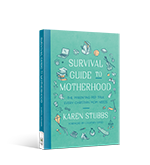
Sign Up for Updates
Connect
TOPICS
- Latest Blog
- Fiction
- Inspirational/Devotional
- Men's Christian Living
- Prophecy
- Women's Christian Living
- View All
ARCHIVES
How Forgiveness is One Anxiety Cure We Often Forget to Think About
Posted on Jul 04, 2023 Topic : Inspirational/Devotional, Men's Christian Living, Women's Christian Living
Posted by : Bob Phillips

“I just can’t get that tune out of my head.” Have you ever heard a song or lyrics you keep remembering...over and over in your mind? The song continually interferes with your thoughts—and it becomes very difficult for you to think about anything else.
This is a type of rumination: a combination of concentration, pondering, and repeating a thought over and over. It’s a form of mentally “chewing on” various comments, problems, or situations in your life.
When cows eat grass or hay, they swallow the food, later vomit it up into their mouths, chew it some more, and then swallow it again. This process is called “chewing the cud.”
When someone hurts you or disappoints any expectations you have for them, negative feelings can arise. Like the cow chewing the cud, we can vomit up negative thoughts, hurtful comments others have made, or situations that have been mentally harmful for us. We keep remembering the event or comment over and over again.
The difference between cows and humans is significant when it comes to rumination. When cows chew their cud, they feel peace and contentment. Relaxed cows chew their cud; cows under stress do not chew their cuds. Humans, however, are usually under various degrees of stress when they chew over their problems and difficulties. Ruminating for humans can cause high blood pressure, anxiety, anger, disappointment, resentment, weakened immune systems, loss of sleep, labored breathing, ulcers, muscle tension, sweating, trembling and shaking, digestive issues, and a host of other physical ailments.
You may ask, “What’s the best and fastest way to break the ruminating process of negative thinking and feeling? How can I choose a good attitude?” There’s a simple answer, but it’s not an easy answer. A great portion of the rumination in our lives revolves around someone who has said or done something to hurt us. After thinking about what happened for a while, we come to the conclusion that what that person or persons did or said to us was not fair. We become hurt, then angry, then resentful. Then we develop a grudge, and then we want some type of vindication or revenge. Welcome to Hurtsville; a lot of people live here.
Now back to the simple answer: We need to forgive them.
With forgiveness, you break the rumination process. You pop the balloon of hatred and revenge. You release yourself from the prison of negative thinking.
Doesn’t that sound better than what you’ve been doing that hasn’t worked? Has all your brooding over the past changed anything?
When you forgive, you in no way change the past—but you sure do change the future. — Bernard Meltzer
Practical Help for Attitude Change in the Area of Forgiveness
When the hornet of memory flies into your mind, learn how to take out its sting. Practice steps for finding the off button of negative thinking.
- Respond quickly when bad attitude thoughts raise their ugly head.
- Acknowledge their presence.
- Question your unrealistic thoughts; do not just accept them as fact.
- Distract yourself by taking a mind detour.
- Pray
- Read your Bible.
- Talk to someone.
- Exercise or go for a walk.
- Determine what set off the negative thinking. Identify the triggers and then eliminate them.
- Follow the steps of Matthew 18:15; talk with the individual with whom you have a problem.
Forgiveness is a sign that the person who has wronged you means more to you than the wrong they have dealt. —Ben Greenhalgh

Read more in Attitude is a Choice—So Pick a Good One by Bob Phillips

